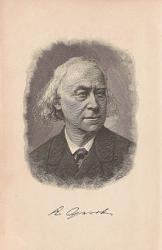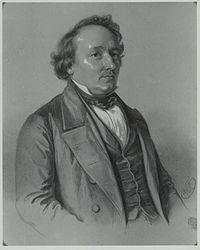1749 - 1818 Hymnal Number: 443 Author of "Himmelan, nur himmelan" in Deutsches Gesangbuch Schöner, Johann Gottfried, son of J. G. Schöner, pastor at Rügheim, near Hassfurt, Bavaria, was born at Rügheim, April 15, 1749. He studied at the universities of Leipzig and Erlangen. In 1772 he became tutor in the family of Herr von Winkler at Nürnberg, by whose influence he was appointed, in Sept. 1773, preacher at St. Margaret's chapel, in the Kaiserburg, at Nürnberg. He was then appointed, in 1783, diaconus of St. Mary's church, and in 1783 diaconus of St. Lawrence's church, where, in 1809, he became chief pastor (Stadtpfarrer). After 1799 he suffered greatly from nervous affections, and in October 1817, he had to resign his offices. He died at Nürnberg, June 28, 1818. (Koch vi. 399; Heerwagen ii. pp. 32, 262, &c.)
Schöner was a popular preacher, and was specially successful with children. He took a great interest in the circulation of the Bible, and founded the Nürnberg Bible Society in 1805. His hymns are the fruit of genuine and earnest piety, and attained considerable popularity. A number were printed separately, or in magazines. The more important of the collected editions are (1) Einige Lieder zur Erbauung, Nürnberg, 1777 [Berlin Library]. (2) Vermischte geistliche Lieder und Gedichte, Nürnberg, 1790. (3) Vollständige Sammlung der geistlichen Lieder und Gedichte von Johann Gott¬fried Schöner, Nürnberg, 1810.
Those of Schöner's hymns which have passed into English are:—
i. Erhebt euch, frohe Lobgesänge. Holy Matri¬mony. Included 1790, as above, p. 51, in 7 stanzas of 6 lines, entitled "After a Marriage." It is one of the best hymns on the subject. It was included, but greatly altered, and in 12 st. (st. iii.—v., vii., ix., being added), as No. 490 in J. E. Gossner's Sammlun, 3rd ed. 1825, beginning " Erhebt euch, frohe Jubellieder." The translation in common use is:—
Raise high the notes of exultation. A good translation, from Bunsen, by Miss Cox, in her Sacred Hymns from the German, 1841, p. 71.
Another tr. is: "Lift up yourselves, ye joyous strains." In the British Magazine, Nov. 1837, p. 517.
ii. Himmel an, nur Himmel an. Longing for Heaven. Included 1810, as above, p. 198, in 10 st. of 8 lines, entitled "Our Conversation is in Heaven, Phil. iii. 20. A call to all Christians." The translation in common use is:—
Heavenward, still heavenward. In full, by Dr. H. Mills, in his Horae Germanica, 1845, p. 163, included, abridged, in M. W. Stryker's Christian Chorals, 1885.
Other hymns by Schöner are:—
iii. Der Glaube fehlt, und darum fehlen. Faith. On the evils of feeble faith. Translated as, "Faith fails; Then in the dust," by Miss Warner, 1858, p. 427.
iv. Es dankt mein Herz! Es jauchzt mein Lied. Pilgrim Song. Tr. as, "O Christ, in gladsome faith arise," by Dr. G. Walker, 1860, p. 95.
v. Friedefürst, vernimm mein Flehen. Passiontide. In 1790 as above, p. 16, in 7 st. of 8 1., entitled " Appropriation of the sorrows of Jesus. Pagsion Hymn." In his ed. 1810, p. 18, altered and beginning, " Friedefürst zu dem wir flehen," and in 8 st.
vi. Ich blick in jene Höhe. Longing for Heaven. In 1777 as above, p. 32, in 14 st. of 4 1., entitled "Removal from the World." Repeated 1790, p. 84, and in Knapp's Evangelischer Lieder-Schatz, 1837 and 1865. Translated as "Mine eyes are thither turning," in the British Herald, July 1866, p. 297, and Reid's Praise Book, 1872. [Rev. James Mearns, M.A.]
--Excerpts from John Julian, Dictionary of Hymnology (1907)
Johann Gottfried Schöner


 My Starred Hymns
My Starred Hymns




